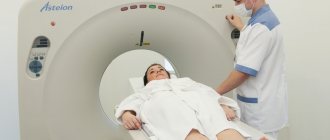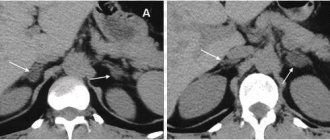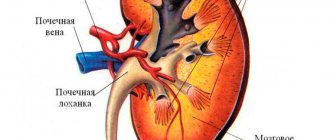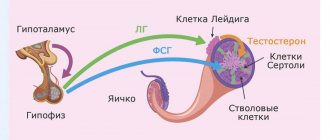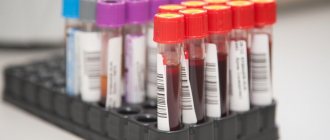Adrenal glands
is a paired organ of the endocrine system, which is a gland located at the upper pole of each kidney.
The adrenal glands are formed by two structures: the medulla (inner) and the cortex (outer). Both substances are regulated by the central nervous system. Each type of substance functions as an independent gland, although anatomically they are combined into one organ. Cortex
. Steroid hormones produced in the cortex control the body's metabolism and energy. There are three zones of the cortex, in each of which specific hormones are synthesized:
- Aldosterone is synthesized in the zona glomerulosa, which affects water-salt metabolism
; - glucocorticoids are synthesized in the zona fasciculata, which regulate the metabolism of proteins, fats and carbohydrates
, as well as
the exchange of nucleic acids
; - In the reticular zone, sex hormones are formed, primarily androgens, which affect the development of secondary sexual characteristics.
Brain matter
produces catecholamines (adrenaline, norepinephrine and dopamine). Adrenaline is synthesized only in the adrenal glands. Catecholamines affect the functioning of the cardiovascular system (increase blood pressure, change the frequency of contraction of the heart muscle), cause an increase in blood glucose and stimulate the breakdown of fats, which is necessary for their absorption by the body. This variety of functions of the hormones produced by the adrenal glands shows how important it is for this organ to function correctly. Disturbances in its functioning affect the general condition of the body. Depending on the type and location of the pathology, the manifestations of disorders may be different.
Main types of adrenal gland diseases
Hyperaldosteronism
Hyperaldosteronism is a pathology in which the adrenal cortex produces excessive amounts of the hormone aldosterone. There are primary hyperaldosteronism, caused by tumors of the adrenal glands themselves, and secondary, which is a complication of other diseases (such as cirrhosis of the liver, chronic nephritis, heart failure).
Symptoms of hyperaldosteronism:
- general weakness;
- increased fatigue;
- headache;
- thirst;
- polyuria (increased urine output);
- hypocalcemia (decreased calcium levels in the blood);
- numbness and cramps.
Adrenal insufficiency
Adrenal insufficiency is a condition characterized by decreased secretion of hormones from the adrenal cortex. Usually develops against the background of other diseases, often accompanied by inflammation of the adrenal glands.
Main manifestations:
- sudden loss of strength;
- loss of appetite;
- weight loss;
- hypotension (low blood pressure);
- functional intestinal disorders;
- nausea, vomiting;
- hyperpigmentation of the skin (excessive deposition of pigment, causing more intense coloring of some areas of the skin);
- nocturia (excretion of most of the daily volume of urine at night);
- elevated blood sugar.
Pheochromocytoma
Pheochromocytoma is a tumor that develops primarily from the adrenal medulla. It is hormonally active, that is, it leads to an increase in the secretion of catecholamine hormones.
The main manifestation of pheochromocytoma is high blood pressure. Against the background of increased blood pressure, a throbbing headache, pale skin, increased sweating, nausea, vomiting, and convulsions may be observed. The disease may also be indicated by attacks of inexplicable fear and some other symptoms.
General cortisol
The steroid hormone of the adrenal cortex, which plays an important role in protective reactions to hunger and stress, is actively involved in the regulation of metabolic processes, called total cortisol. An increased concentration of this substance in the blood is dangerous, as it is a sign of serious illness. Expecting a child is the only situation in which high levels of cortisol in the body are considered normal - they increase approximately 2-5 times, which is completely normal.
Indications for analysis:
- hirsutism;
- very early sexual development;
- constant muscle weakness;
- oligomenorrhea;
- Addison's disease;
- unexplained appearance of pigment spots on the patient’s skin;
- Itsenko-Cushing's disease;
- osteoporosis.
Symptoms of adrenal diseases
You can suspect that the cause of pathological processes lies precisely in a disease of the adrenal glands if there is a combination of several main symptoms, such as:
General weakness
A feeling of general weakness is characteristic of both hyperaldosteronism and adrenal insufficiency. Along with weakness, the patient may complain of increased fatigue and decreased performance.
Headache
Headaches are typical for diseases of the adrenal glands. Headaches are often accompanied by changes in blood pressure. With adrenal insufficiency, it becomes low; with pheochromocytoma, hypertension is observed.
More about the symptom
Nausea
With diseases of the adrenal glands, attacks of nausea leading to vomiting are possible.
More about the symptom
Urinary disorders
With hyperaldosteronism, polyuria is observed - increased urine output. The body strives to compensate for the loss of fluid, hence the occurrence of thirst. Urinary problems are also observed with adrenal insufficiency.
Convulsions
Adrenal diseases such as hyperaldosteronism and pheochromocytoma can manifest as seizures.
More about the symptom
Change in skin color
With adrenal insufficiency, hyperpigmentation is observed; pheochromocytoma, on the contrary, is characterized by increased pallor of the skin.
Weight loss
One of the most common symptoms of adrenal insufficiency is weight loss. Food is less digestible (impaired absorption in the intestines). The patient loses his appetite. All this leads to weight loss.
Sources
- Bulska M., Szczesniak P., Pieta-Dolinska A., Dorobek P., Parafiniuk J., Oszukowski P., Orszulak-Michalak D. Different modes of delivery and hormonal stress response. // Ginekol Pol - 2021 - Vol - NNULL - p.; PMID:33844248
- Chantzichristos D., Svensson PA., Garner T., Glad CA., Walker BR., Bergthorsdottir R., Ragnarsson O., Trimpou P., Stimson RH., Borresen SW., Feldt-Rasmussen U., Jansson PA., Skrtic S., Stevens A., Johannsson G. Identification of human glucocorticoid response markers using integrated multi-omic analysis from a randomized crossover trial. // Elife - 2021 - Vol10 - NNULL - p.; PMID:33821793
- Yan D., Zhang X., Chen C., Jiang D., Liu X., Zhou Y., Huang C., Zhou Y., Guan Z., Ding C., Chen L., Lan L., Fu X ., Wu J., Li L., Yang S. Characteristics of Viral Shedding Time in SARS-CoV-2 Infections: A Systematic Review and Meta-Analysis. // Front Public Health - 2021 - Vol9 - NNULL - p.652842; PMID:33816427
- Lai CH., Ho SC., Pan CH., Chen WL., Wang CC., Liang CW., Chien CY., Riediker M., Chuang KJ., Chuang HC. Chronic exposure to metal fume PM2.5 on inflammation and stress hormone cortisol in shipyard workers: A repeat measurement study. // Ecotoxicol Environ Saf - 2021 - Vol215 - NNULL - p.112144; PMID:33743405
- Ishii M., Horita N., Takeuchi M., Matsumoto H., Ebina-Shibuya R., Hara Y., Kobayashi N., Mizuki N., Kaneko T. Inhaled Corticosteroid and Secondary Glaucoma: A Meta-analysis of 18 Studies . // Allergy Asthma Immunol Res - 2021 - Vol13 - N3 - p.435-449; PMID:33733638
- Rosa IN., de Sousa Munhoz Soares AA., Rodrigues MP., Naves LA. Classic cardiovascular risk factors improve in elderly very hypopituitary patients treated on standard hormone replacement in long term follow-up. // Clin Diabetes Endocrinol - 2021 - Vol7 - N1 - p.6; PMID:33731193
- Liu L., Jing FY., Wang XW., Li LJ., Zhou RQ., Zhang C., Wu QC. Effects of corticosteroids on new-onset atrial fibrillation after cardiac surgery: A meta-analysis of randomized controlled trials. // Medicine (Baltimore) - 2021 - Vol100 - N11 - p.e25130; PMID:33725992
- Pinna S.M., Scabini S., Corcione S., Lupia T., De Rosa FG. COVID-19 pneumonia: do not leave the corticosteroids behind! // Future Microbiol - 2021 - Vol16 - NNULL - p.317-322; PMID:33709775
- Juul S., Nielsen EE., Feinberg J., Siddiqui F., Jørgensen CK., Barot E., Holgersson J., Nielsen N., Bentzer P., Veroniki AA., Thabane L., Bu F., Klingenberg S ., Gluud C., Jakobsen JC. Interventions for treatment of COVID-19: Second edition of a living systematic review with meta-analyses and trial sequential analyzes (The LIVING Project). // PLoS One - 2021 - Vol16 - N3 - p.e0248132; PMID:33705495
- Chalmers JD., Crichton ML., Goeminne PC., Cao B., Humbert M., Shteinberg M., Antoniou KM., Ulrik CS., Parks H., Wang C., Vandendriessche T., Qu J., Stolz D ., Brightling C., Welte T., Aliberti S., Simonds AK., Tonia T., Roche N. Management of hospitalized adults with coronavirus disease 2021 (COVID-19): a European Respiratory Society living guideline. // Eur Respir J - 2021 - Vol57 - N4 - p.; PMID:33692120
Methods for diagnosing adrenal diseases
Laboratory diagnostic methods are used to determine the functional state of the adrenal glands. Instrumental methods are used to determine the size of the adrenal glands and identify tumors.
Blood test for hormones
A blood test for hormones is the main laboratory method for diagnosing adrenal diseases. What matters, first of all, are indicators such as cortisol, aldosterone, and DHEA sulfate.
More information about the diagnostic method
24-hour urine test
A 24-hour urine test for cortisol is also used to assess adrenal function.
More information about the diagnostic method
Magnetic resonance imaging (MRI)
MRI is one of the most sensitive instrumental diagnostic methods used to detect adrenal tumors.
More information about the diagnostic method
Computed tomography (CT)
Computed tomography (MSCT of the kidneys and adrenal glands) is currently the most common method for diagnosing adrenal tumors.
More information about the diagnostic method
Other instrumental diagnostic methods
Ultrasound of the kidneys and adrenal glands is not a sufficiently reliable means of detecting adrenal tumors. The adrenal glands cannot always be visualized on ultrasound. Radiography (ordinary x-rays) is practically not used to examine the adrenal glands today. Its place was taken by computed tomography (as a more informative research method). In some cases, adrenal scintigraphy is used.
Sign up for diagnostics To accurately diagnose the disease, make an appointment with specialists from the Family Doctor network.
Preparation
It is important to properly prepare for hormone tests. At least a day before the examination, try to avoid stress, strong emotions, and heavy physical activity. Before the test, you need to get enough sleep and rest.
Diuretics, oral contraceptives and some other hormonal drugs can distort the results. If you regularly take any medications, check with your doctor to see if they will affect the diagnostic results.
You can take urine and blood tests to assess the condition of the endocrine system in our clinic. For more details on how to prepare for diagnostics, please call the phone number provided.
All articles
5% discount Print coupon from our website

Ask your question on the website Get professional advice!
Methods of treating adrenal diseases
Endocrinologists at the Family Doctor have the necessary qualifications and experience in diagnosing various diseases of the adrenal glands. If you experience symptoms that worry you, you should consult a doctor as soon as possible in order to begin treatment at an earlier stage of the disease. Timely treatment will allow you to get the maximum and fastest effect.
If a pathology is detected, treatment is prescribed depending on the specifics of the identified disorders. If the pathology of the adrenal glands is a complication of another disease, then it is necessary to eliminate the cause that caused it. To alleviate the patient's condition, symptomatic therapy is carried out.
Hormone therapy
First of all, treatment is aimed at restoring normal hormonal levels. In case of adrenal insufficiency, hormone replacement therapy is performed.
Surgery
If tumor processes develop, surgical treatment may be required.
Make an appointment Do not self-medicate. Contact our specialists who will correctly diagnose and prescribe treatment.
Rate how useful the material was
thank you for rating
What kind of doctor examines women and men, children
Due to the variety of functions of the adrenal glands (formation of corticosteroids, sex hormones, catecholamines), suspicion of endocrine pathology may arise among doctors of different profiles:
- therapist, cardiologist;
- nephrologist;
- gynecologist or urologist, andrologist;
- psychiatrist (unmotivated aggression, depression, panic attacks).

In children, the first symptoms are determined by the pediatrician. In all cases, the patient is advised to be examined by an endocrinologist, who will order further examination, receive its results, determine the diagnosis and prescribe therapy. Some diseases can only be treated surgically, so in the future the patient can be referred to a surgeon who has experience in removing the adrenal glands or to an oncologist.
References
- Nazarenko G.I. Clinical assessment of laboratory research results / G.I. Nazarenko, A.A. Kishkun - M.: Medicine, 2006 - 543 p.
- Allen MJ; Sharma S. Physiology, Adrenocorticotropic Hormone (ACTH) March 3, 2021 URL: https://www.ncbi.nlm.nih.gov/books/NBK500031/ (accessed 01/10/2020)
- Fish S., MD Adrenocorticotropic Hormone (ACTH), October 2019 URL: https://www.hormone.org/your-health-and-hormones/glands-and-hormones-a-to-z/hormones/adrenocorticotr… ( access date 01/10/2020)


